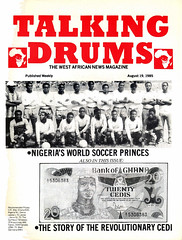Economic recovery programme turns blue
"The 'generosity' of the World Bank and the International Monetary Fund (IMF) started with the December 1983 Donors Conference held in Paris at which nearly $145 million of loans were promised to Ghana. A year later, more loans were pledged to the tune of $450 million plus additional support of $75 million to develop an export programme.
The IMF granted Ghana in addition, a loan of $236 million in 1982 and $355 million in 1983 while the World Bank proposed to send an additional $200 million to rehabilitate the Railway network. Besides, the International Finance Corporation is supporting the Mining and Wood industries particularly a $120 million for a major gold mining company. The utilisation of the loans have been conditioned by steep austerity measures which have reduced the purchasing power of the ordinary person, but the government continues to wallow in self-deception of 'moderate growth'.
A Peoples Daily Graphic report of 20th July quoted the Secretary for Finance & Economic Planning as saying that the rate of inflation has drop- ped from 122.8% in 1983 to 39.6% in 1984 and expected to reach 20% by the end of the year. The World Bank has described the Economic Recovery Pro- gramme (ERP) as one of "encouraging progress", while the British Foreign Secretary has recommended Ghana's "Success story of bold decisions of devaluations and high agricultural prices" to developing countries while addressing the Royal Commonwealth Society in London.
The facts existing inside the country however contradict these impressions of success and progress being bandied about in international circles. The massive successive devaluations of the Cedi, the removal of subsidies, the in- creases in prices especially of petrol and of nearly all commodities conceivable have created critical conditions in Ghana despite the doubling of the minimum wage and the increase in producer price of cocoa. The new level of taxes announced recently for private and small businesses are likely to even further reduce the purchasing power of the ordinary person.
There have been rumblings from the labour unions and from the plethora of 'progressive movements' who see the economic recovery programme and the austerity measures as 'cowering in the face of IMF and World Bank prescrip- tions'. The Trades Union Congress has been reported as saying that the ERP in its third year has not brought any hope to the working people. An Official of the Industrial and Commercial Workers Union believes that "the lay- ing off of workers especially within the Ghana Cocoa Board is likely to accentuate the terrible social conditions prevailing in this country".
The June 4th Movement has also been quick to point out that the existing Economic Recovery Programme (ERP) is turning blue instead of red and that imperialist economic policies are being pursued. The New Demo- cratic Movement concurs that the eas- ing of controls on imports and the liberalisation of trade have produced expensive goods on the market which workers are not capable of buying.
Despite these, the Finance and Economic Planning Secretary remains completely obsessed with "how to obtain private investors into the country". The recently published Invest- ment Code is an indication of his line of approach.
What has happened in this country within the past month is what is going to intensify the critical conditions of life in this country. There have been in- creases in hospital charges, a new Road development Levy (road tax) has been instituted, there are confirmed reports of hefty increases in school fees to come into effect before September, all of these quite apart from current increases in domestic utility services, viz,electricity, water, etc.
In all these, it is the taxpayer who is shouldering the burden and there does not seem to be an end to it. In fact the austerity measures have only just begun, and it has begun with the call on every citizen to pay directly for health, education, road usage and travel, domestic utilities, etc. The ques- tion is why do people have to pay tax on their incomes under such circumstances? At a recent seminar on child education, a questioner posed the obvious question: "What benefits do we get from paying income tax if the ordinary person cannot seek a relief, however short term, for his children's education?
The pity of it all, come to think of it, is where is the public forum for ex- pressing one's views even on the 'methods' of public spending? A popular weekly newspaper expressed a similar thought: " We are a far cry from a national consensus as to objectives, methods and procedures in mat- ters dealing with the economy. The 'participatory-decision making' stance of the government seems to have been thrown to the wind".
